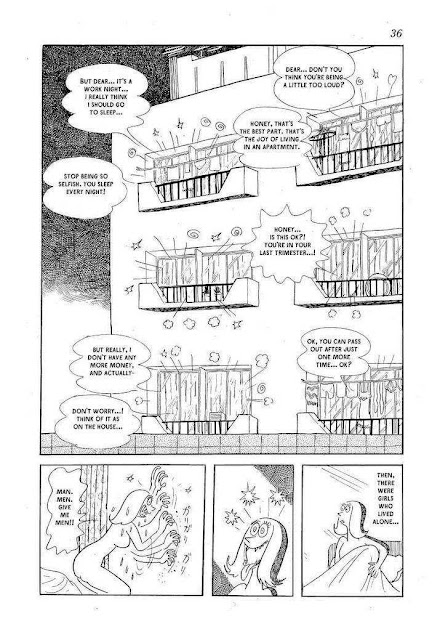Osamu Tezuka became widely associated, in both his own country and in others, with squeaky-clean (usually) kids' entertainment. But he had attempted more adult works even before his ASTRO BOY breakout, such as 1949's METROPOLIS. And toward the end of the 1960s, the God of Manga became increasingly involved in manga with pronounced sexual content.
FUUSUKE is a minor work, consisting of eleven installments in the life of the title character. There's no real continuity between the stories, a few of which take place back in Japan's feudal era. The only point the tales have in common is to show the hapless Fuusuke getting humiliated, like a "salaryman" version of Dagwood Bumstead. But for all Dagwood's ignominies, at least he didn't have his sexual capacities trashed. True, everything that happens in the one mythic FUUSUKE story, "Women Howling at the Moon," happens within the main character's dream. But Tezuka wasn't describing , Jules Feiffer-style, the shortcomings of one protagonist, but of the male sex generally, at least in 1969 Japan.
Fuusuke's dream imagines that Earth's hunger for the commodity of "moon rocks" following the 1969 lunar landing results in the strip-mining of Luna. Though the second panel gives us the image of the moon-rocket as penis, it's Earth's vaginas that are empowered by increased lunar radiation. (Tezuka's explanation of the moon's increased shininess oddly invokes an image associated with male aging.) Tezuka also loosely references the moon's much storied influence upon women's periods, though he doesn't sustain the allusion.
The lunar radiation has a pronounced effect on women (possibly in the rest of the world too, though Japanese life alone is spotlighted). The females of the species become endlessly horny on full-moon nights, so much so that they not only attack their husbands, but any males they can find. To Fuusuke's immense aggravation, he seems to be the one Japanese male that none of these rapacious women will bother with. Meanwhile, women everywhere celebrate their newfound sexual freedom, just as if moonshine had taken the place of the Pill.
Though it's impossible to gauge passage of time in Fuusuke's jumbled dream-world, things swiftly escalate from isolated attacks to hordes of women attacking the police forces. Moreover, in a move that seems counter-intuitive, some females become "black widow" cannibals. Not surprisingly, Tezuka is careful not to include any references in the dream to the fate of Japanese children amid all this hullabaloo.
One of Fuusuke's comrades avers that "none of this would have happened if men hadn't become so weak." This sentiment is echoed by the ending, in which, just before the protagonist wakes up, he's being lauded as the only male immune to being ravaged, though only because of his unexplained total lack of sex appeal. Tezuka's final word is, "This is the sad dream that the most unpopular men in the world have to comfort themselves."
But this isn't the final word according to the dynamics of the story. Tezuka certainly puts a lot more effort into elaborating his sex-scenario than he needed to simply explain Fuusuke's sexual alienation-- especially since the dream doesn't really "explain" anything.
Traditional "the fox and the grapes" rationalizations usually follow some pattern of criticizing the tastes of the opposite sex-- women are superficially attracted to money, social position, good looks or displays of macho physicality. But the Moon-Howlers display no discrimination whatever. None of the victimized men are better looking than Fuusuke, and there's nothing to mitigate the opinion of Fuusuke's friend, that all Japanese men have become weak. And what do money or social position matter, since the women aren't forcing their conquests into marriage, and at least some of those conquests end up in a cook-pot?
In the Howlers' near-total lack of discrimination, they resemble the male of the species, who constantly want sex with any available female. Western culture, in fact, compares horny men to another creature known for howling at the moon: the venerable Canis Lupus. It's just as simplistic to say "rape is only about power" as it is to say "rape is only about sex," but clearly ravishment depends upon some power differential. Does the weakness of Japanese men trigger the Moon-Howlers to assume the role of rapacious males? Tezuka doesn't precisely say this, but claiming that lunar radiation makes women want to kill and devour their mates recalls a remark attributed to Simone Weil: that male rapists physically dominating women prior to sex is comparable to a butcher "tenderizing" meat.
The reason for Fuusuke's exclusion is a joke without a punchline. He's certainly not being excluded because he's bad breeding material, because the Moon-Howlers are utterly unconcerned with breeding, There's no answer to Fuusuke's existential question in the dream as such, but there's the suggestion of a clue in Tezuka's invocation of the menstrual cycle. Accepting the generalization that the cycle can be distinguished into two main phases-- the follicular, which encourages female horniness, and the luteal, which discourages sexual responsiveness-- then the Moon-Howlers seem to enter the follicular stage whenever they stalk Japanese men. Only Fuusuke, for whatever unknown reason, shifts them into the luteal phase, in which his mere presence "switches them off."
"Moon's" image of rapacious women finds an echo in his next-year work APOLLO'S SONG. In this more developed work, Tezuka focuses on a young male who's just the opposite of Fuusuke-- being a more traditional aggressive male-- but who is still utterly trammeled by female influences that leave him "cut off at the knees," or some similar compromise of his masculinity.








No comments:
Post a Comment